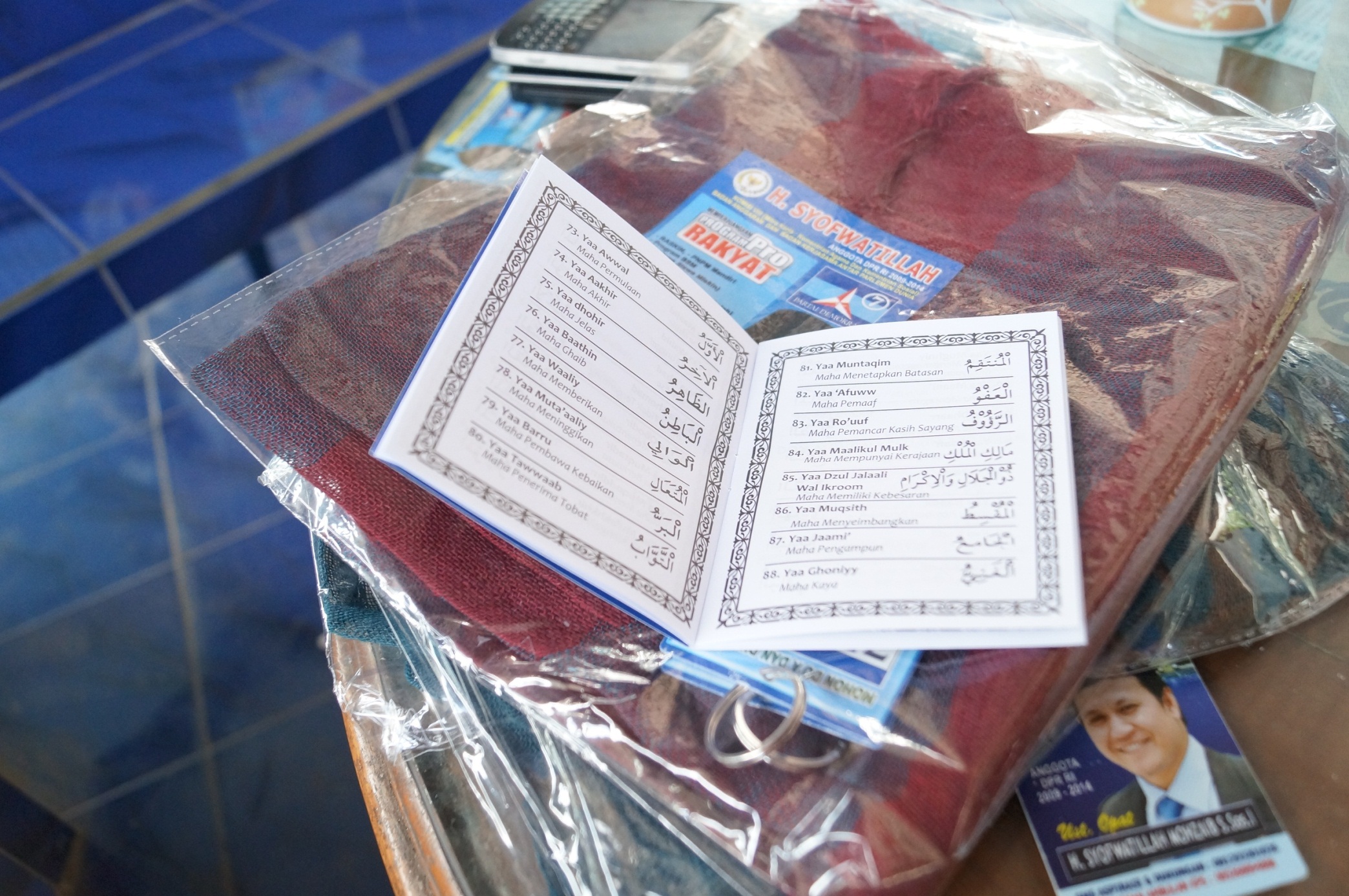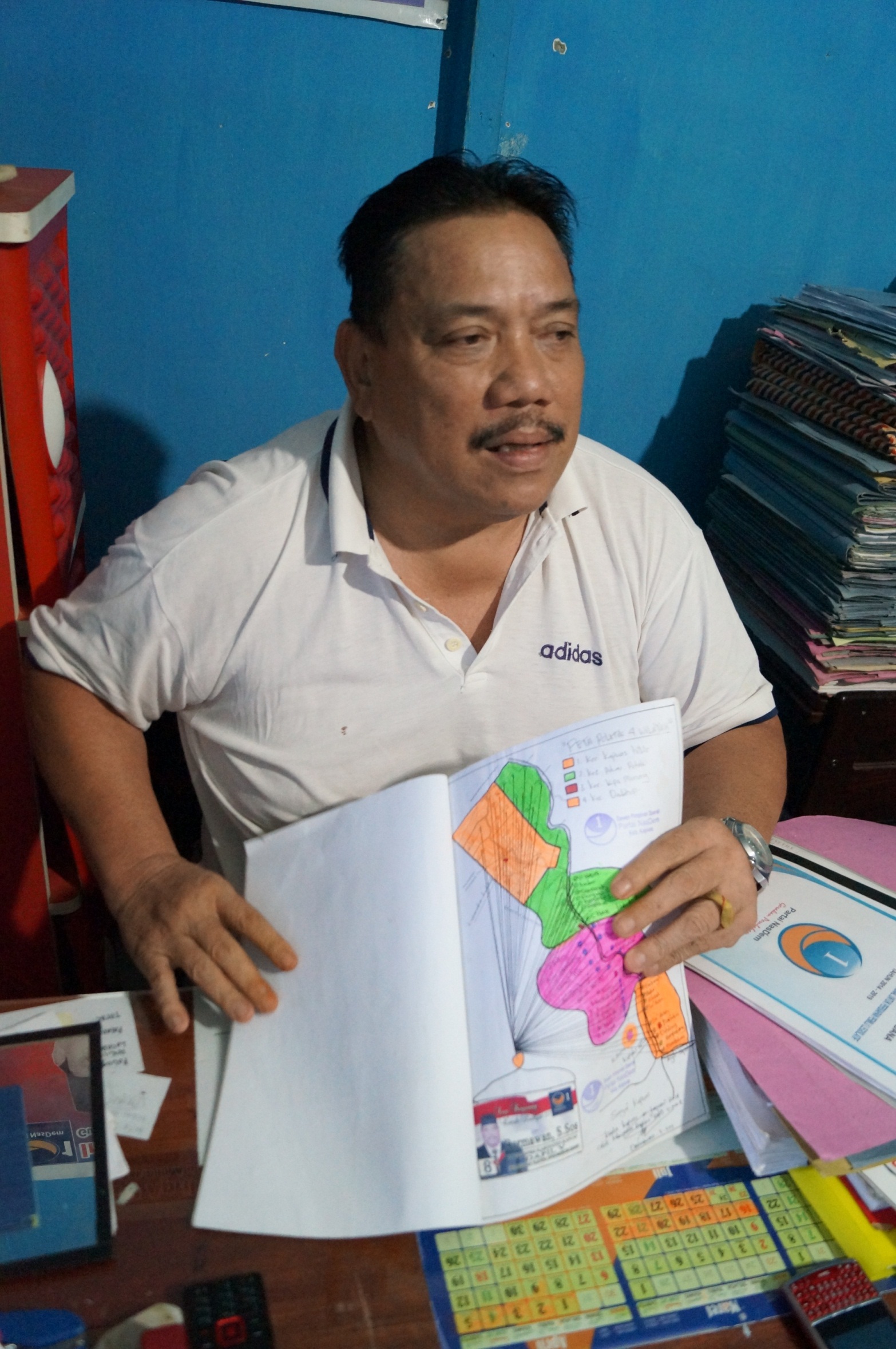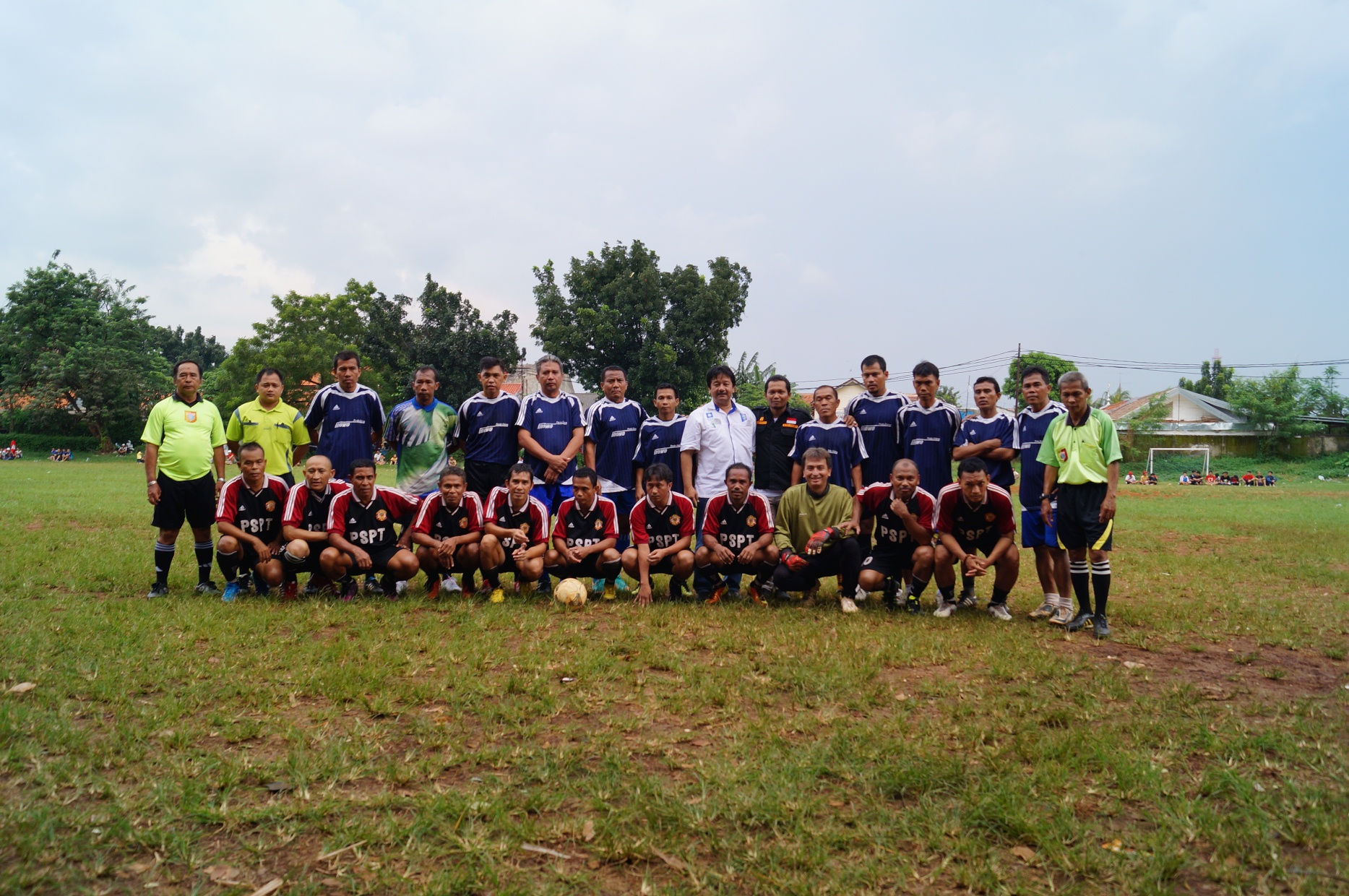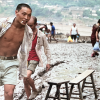The distribution of money, goods and other benefits is an integral part of electioneering in Indonesia
Edward Aspinall
 A headscarf, a prayer book, and some mementoes: a typical getting-to-know-you gift – Edward Aspinall
A headscarf, a prayer book, and some mementoes: a typical getting-to-know-you gift – Edward Aspinall
At a meeting between a sitting member of the provincial parliament of Yogyakarta, and about 30 youths and men in a village on the outskirts of the city, the parliamentarian has just wrapped up a 20 minute appeal for support. He is from PDIP (Indonesia Democracy Party –Struggle) and all the men are party supporters, so it should have been an easy pitch trying to convince them to back him again. But then one youth pipes up, telling the candidate that people from other parties have been coming into the village, long a PDI-P base, and offering ‘envelopes’ (ie. money) in exchange for votes.
The candidate barely draws breath: ‘Well if we have to give them envelopes, we’ll give them envelopes, because PDIP has to win here. Ibu Mega [ie Megawati Soekarnoputri, the party leader] has forbidden this, but Bu Mega has never come to this village.’ Then he corrects himself, telling the crowd that he would prefer not to hand out money on a person-by-person basis, but would rather provide support for whatever small-scale development programs or collective business activities they have in the village. At the next meeting in a neighbouring village, things are smoother, but here the candidate had arranged before the meeting that he would pay for volleyball equipment and uniforms for the youths. The village coordinator announces this to the meeting, and everyone looks satisfied.
Later that evening, the candidate complains how much worse things are this year than during the last election, in 2009. The open list electoral system, in which candidates have to compete for the highest personal vote in order to be elected, is destroying the parties, he says, and destroying their relations with their traditional supporters. Now, everywhere he goes, people ask him for money, including in areas that for years have been intensely loyal to PDIP. ‘I started out by telling them that they shouldn’t use money’, he says, ‘In the end, I got sick of it. Now I just ask them: How much do you want?’ Despite what he told the group earlier in the evening, he hasn’t quite decided whether he’ll hand out individual payments to voters, but he seemed to be tending strongly that way.
Part of the system
I heard versions of this lament many times during a 40-day trip through 18 provinces in the lead up to Indonesia’s parliamentary elections on April 9, speaking to about 60 candidates at all levels (district, province and national), as well as campaign workers. Almost everywhere, candidates complained about how Indonesian voters have become increasingly ‘pragmatic’ or ‘transactional’, and how they are unprepared to vote for people who do not provide them with a tangible material benefit – money or some other gift. The other side of this lament, of course, is expressed by voters, many of whom are alienated from the political system and believe that parliamentarians provide them with nothing useful apart from the handouts they distribute once every five years. Why not, in this view, take what you can when it’s on offer, even if that means waiting for the highest bid, or taking money and gifts from several candidates and then voting for only one of them?
Not surprisingly, almost all the candidates I spoke to featured patronage distribution – the distribution of money, gifts or other material benefits – as a central, indeed most often as the central, pillar of their campaign strategy. Only two or three candidates claimed to give nothing at all to voters. But patronage distribution comes in many different categories, each attendant with its own costs and risks.
Gift giving
A first category are simple gifts that candidates present to voters as a way of introducing themselves, or in order to try to create or strengthen an ‘emotional bond’ (ikatan emosional – another phrase that rolls constantly off the tongues of candidates in Indonesia) between them and the recipients. Often such gifts are distributed when the candidate attends a community-level meeting (sosialisasi is the Indonesian term) to introduce him or herself to the voters, or when members of the candidate’s campaign team (known as tim sukses, or ‘success team’) makes initial contact with a voter at home or at a meeting.
 A candidate in Kapuas, Central Kalimantan, with a map showing his success team and his village strategy – Edward Aspinall
A candidate in Kapuas, Central Kalimantan, with a map showing his success team and his village strategy – Edward Aspinall
The variety of gifts provided in such contexts is virtually limitless, but especially common are gifts imbued with some sort of religious or other symbolic meaning: krudung or head scarves, prayer mats, sarung that men can wear when they go to the mosque, prayer books, bibles, and the like. It’s precisely their symbolic meaning that makes such gifts attractive to politicians; they are hoping that some of that meaning will rub off onto them. As one candidate put it to me, he liked to hand out prayer mats so that ‘people remember me when they pray.’ Equally common at such times is the distribution of basic foodstuffs, typically, bags of noodles or rice, or bottles of cooking oil, though here too the variety is virtually endless. Candidates often talk in a more frankly calculating way about such gifts of food, stressing the poverty of the recipients and their gratitude at receiving such assistance.
Such ‘opening’ gifts are rarely considered to be sufficient in themselves to ensure that the recipient will vote for the giver; instead they can be seen as the equivalent of an icebreaker or a keepsake – something that will smooth the initial connection between the candidate and the voter, a memento of a pleasant shared experience, a reminder of the connection between them, as well as a sign that the giver is someone who cares about the community and is willing to help the poor. Interviewees often compare such gifts to oleh-oleh, the small presents one distributes to one’s friends and family after going on a journey. They describe them as a way of building a ‘familial’ relationship between the politician and the voter.
Typically, politicians will say that such gifts only help to deliver a vote if they are backed up with some other sort of appeal or strategy: for example, the candidate may have a highly personable style which succeeds in building a personal rapport with the recipients. Or it could be that the initial gift will be reinforced by further gifts down the track, or by a promise (or a record) of development programs for the village or urban community in which the recipient lives.
A second category of gift are those that are handed out at larger public campaign events, such as public rallies, village parties, musical performances or competitions (involving anything from dominoes to birdsong to fishing) sponsored by candidates, or other events. Food, drink and ‘transport money’ are all but ubiquitous at such events, but so too are ‘door prizes’. Door prizes can be cash or goods and can range from small items (kitchenware and other household items were the most common variety I saw) through to the major gifts given by really cashed-up candidates, such as motorbikes or umroh (minor haj) trips to the holy land. At public events, too, candidates and their support teams will often provide services of some sort for those present: free medical checkups and treatment are particularly common (this has long been a central campaign strategy of the PKS (Prosperous Justice Party) but is now mimicked by many candidates from across the political spectrum).
If the door prizes are designed to provide a bit of excitement for what might otherwise be dull campaign events, medical services are intended to demonstrate the candidate’s social conscience and public mindedness. Hence, many candidates also provide ongoing services between elections, such as ambulances that provide free transport to hospitals, or which carry corpses to cemeteries; fire trucks; garbage disposal; and so on.
Collective goods
A third category of gifts are collective in character: donations made by a candidate to members of a community to help build or repair some sort of community facility. Sometimes called club goods by political scientists, the most common form of such gifts in Indonesia are donations in cash or kind to help build or repair a place of worship (a mosque, mushollah, church, etc), followed closely by assistance for roads, irrigation canals, or other community infrastructure. Also very common are donations to community organisations, such as gifts of equipment (sound systems, tarpaulins, crockery, plastic chairs and the like) to women’s groups such as prayer groups (kelompok pengajian or majelis taklim) or PKK (Family Empowerment and Welfare) units, or of sports equipment, uniforms and playing fields to village sport clubs. Almost every candidate will give at least some of these sorts of gifts if they can afford it.
Often, these donations are made after a meeting between the candidate and members of the local community. Such deals – especially if they are for village infrastructure – are usually brokered by the village head, or the head of a smaller geographic unit (such as an RW, neighbourhood association), or some other community leader, who will then promise a ‘commitment’ (komitemen) or ‘political contract’ (kontrak politik) that the community will vote for the candidate. Some candidates rely wholly on this sort of gift, feeling that individual gifts are a form of morally questionable ‘money politics’, while gifts that benefit an entire community are acceptable either as community development or as charity. Accordingly, candidates often describe such donations as part of their religious obligations in the form of alms-giving.
The problem for candidates who use a strategy of providing collective gifts is whether they are truly effective in instilling a sense of obligation on the part of recipients to vote for the giver, and whether village heads and similar community leaders are really able to deliver on their side of the bargain. One candidate in Yogyakarta recalled that he had made a major donation to help renovate a village mosque in the lead up to the 2009 election, but received hardly any votes in the village in question. When he visited the village leaders after the election and asked them about this result, one of them told him: ‘Sorry sir, the problem is that it’s not the mosque that votes. It’s the people.’ Apparently another candidate’s team had come into the village shortly before voting day and handed out cash to residents.
The picture is thus very mixed: some candidates still rely heavily on community donations and on the brokerage of community leaders, others try to reach down directly to the individual voters; many mix both strategies.
Vote buying
This brings us to a fourth category: vote buying. This approach entails the provision of individual cash payments, or goods, to voters in the immediate lead up to the election. Almost all of the opprobrium directed toward ‘money politics’ in Indonesia is reserved for this phenomenon. Most candidates don’t regard the varieties of gift-giving described above as part of money politics at all, though they are in fact on a close continuum. Indeed, I often heard phrases like ‘I reject money politics, that’s why I only give out head scarves’. Others will explain in great detail how they pay for community facilities whenever asked, but they insist that they reject ‘retail’ vote buying.
Even so, vote buying itself is very common and members of the large research team I was involved in found evidence of it almost everywhere, though with great variety in its levels of intensity, its social acceptability and the sums paid. The amounts given vary greatly, from figures as high as Rp. 400,000 (about US$40) for a ‘packet’ of three votes for the DPR and two DPRD in resource-rich parts of the country, down to Rp. 30,000 in parts of Central Java.
Indeed, we were surprised by quite how open many candidates were in discussing this practice, despite its illegality. For example, in one Central Java constituency, most candidates freely admitted that they engaged in vote buying and some were willing to explain how they did it in detail.
The methods of distribution vary from candidate to candidate, but the vast majority follow a standard pattern that goes like this. In the months leading up to the election, the candidate establishes a ‘success team’ (though not all candidates like this term) that consists of district, subdistrict and village level coordinators and then ‘volunteers’ – basically, vote brokers – in the villages themselves. Hundreds, even thousands, of people can thus be involved in a single team, spread throughout the entire constituency, or concentrated through the areas which the candidate views as his or her base.
 A candidate from PAN (National Mandate Party) at the culmination of a months’ long football tournament he’s been sponsoring, South Jakarta – Edward Aspinall
A candidate from PAN (National Mandate Party) at the culmination of a months’ long football tournament he’s been sponsoring, South Jakarta – Edward Aspinall
Each village vote broker (the terms used locally for this person vary greatly too) collects a list of names and addresses, sometimes also with ID numbers, telephone numbers and signatures, usually of somewhere between 10 and 50 individual voters, typically people who know the broker well. In exchange, the brokers are paid modest honorariums, or are promised future deals entailing access to village development projects or other benefits (again, the inventiveness and the range of rewards is remarkable). They are often also promised bonus payments in cash or kind (e.g. a gift of a motorcycle) if they do exceed their target of votes. Sometimes, the brokers collect names at ‘sosialisasi’ events where the candidate is present, but they usually draw up their lists by visiting the homes of their close neighbours, relatives, or friends. Sometimes the voter will be given a small payment or gift at this point; sometimes the broker simply explains a bit about the background of the candidate and his or her promises for the community.
In order to ensure that they are genuinely comprised of people who have promised to vote for them, candidates will typically check the lists that are given to them at the end of this process. Often they will visit or telephone a random sample of the names on the lists (often candidates have a special, secret team that does this cross-checking). Sometimes, they will send out team members to do a full recheck of the list as voting day draws near to ensure that the voters have not changed their minds or made a commitment to another candidate in the meantime.
Finally, in the days leading to the election, the payment is made, usually by the village-level vote broker who knows the recipient intimately. Candidates have different views on when it is best to make the payment: too many days before the vote and you run the risk you’ll be trumped by someone coming in and offering a later payment; leave it too late and it can be a logistical nightmare to make sure the money actually gets to all the voters on your list. All candidates also worry that their brokers will steal a good chunk of the money that passes through their hands.
Usually the payment is presented in a way that describes it as recompense for the inconvenience and loss of income that going to the polling booth supposedly entails. Even so, most candidates admit that there is no way of ensuring that those who receive money will vote for them (many use the term ‘margin error’ – in English – to explain the discrepancy between the number of people who are paid and the number of votes they obtain). However, a hit rate of 50 per cent is generally considered to be a success, and enough to ensure election in a well-organised campaign.
The institutionalisation of patronage
This brief review in no way summarises the full range of patronage politics encountered in the last election. To do that would require many more pages. And though ‘money politics’ is ubiquitous, many people – candidates and voters alike – feel dissatisfied with its influence and are seeking ways out. Some of these methods, however, are pointing toward the institutionalisation of patronage at the very heart of the political system.
In particular, many incumbent legislators are turning toward government programs rather than private funds to help them build ties with local constituents. In some regional parliaments, there are specially designated ‘aspirations funds’ (known in other countries as constituency development funds, or more colloquially, as pork barrel funds) that allocate a set budget for each legislator, which they can then direct toward development projects and assistance grants in their constituency. Members of legislatures that lack such schemes (including the DPR) access funds by way of sitting on the commissions that are such an important part of legislatures in Indonesia. Sitting on a suitable commission (the commission in charge of infrastructure is often seen as the most lucrative, though agriculture is also highly beneficial) provides a legislator with the ability to lobby government officials from relevant ministries to direct projects and programs toward their constituencies.
However they access the funds, the basic model is relatively simple. First, you direct government programs – for village infrastructure projects, grants of hand tractors, fertiliser, seedlings or other materials to farmers’ cooperatives; training programs for members of religious networks; building grants to schools; virtually anything – to areas where you won a high vote in the last election, or where you want to expand your support base. Second, you build personal links with the chief beneficiaries of the program (the head of a farmer’s cooperative that receives a donated cow might not only be very grateful to you personally, but also hopeful about receiving future largesse) and make sure they know it was you who got them the program. Third, you promise the recipients a steady flow of benefits for them and their community from future programs, provided they keep supporting you in elections. In this way, out of a web of government programs a legislator can build for himself or herself a political network, and a home voter base. This is what almost every incumbent legislator I encountered was trying to do, albeit with varied levels of success.
Some incumbents see this strategy as an alternative to personal gifts and vote buying; others still feel they need to supplement such programs with individual gifts or cash payments, in order to ensure that the beneficiaries of ‘their’ programs actually go to the polls and cast their ballots. Whatever happens, given the ubiquity of money politics and political gifts, this sort of institutionalised pork barrel politics is probably the best that Indonesia can hope for in the near future. So long as Indonesia retains an electoral system that encourages a strong personal vote, the incentives for politicians to build support by offering pork and patronage will remain very high. Even though so many people are sick of money politics, few seem to be able to point to a way out.
Edward Aspinall (edward.aspinall@anu.edu.au) researches Indonesian politics at the Australian National University. During the elections he was helping coordinate a large research project that involved collaboration between the ANU and the University of Gadjah Mada. Fifty researchers were distributed across the country, interviewing over 1000 candidates and campaign workers, observing campaign events and analysing the results. He is very grateful to the insights provided by all those researchers, and to the Centre for Democratic Institutions for supporting the research.











